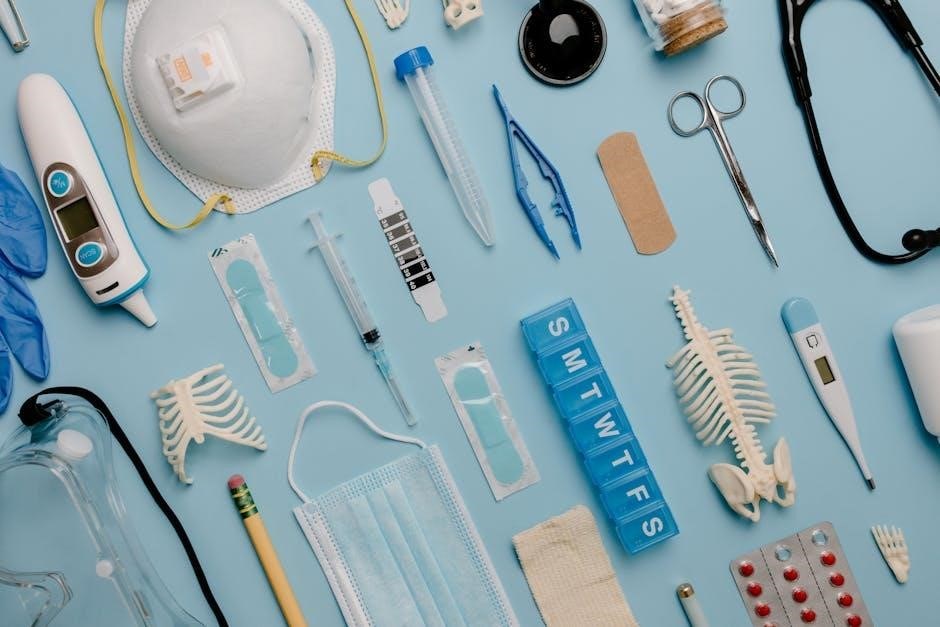Overview of Nursing Mastery
Nursing mastery is the cornerstone of professional excellence, emphasizing the acquisition of advanced clinical skills and evidence-based knowledge․ A comprehensive guide, such as the Nursing Mastery PDF, offers structured frameworks and best practices to enhance competency․ It aligns with mastery learning models, focusing on continuous improvement and proficiency in patient care․
1․1․ Definition and Importance of Nursing Mastery
Nursing mastery represents the highest level of competency, combining advanced clinical skills with evidence-based knowledge․ It ensures nurses deliver high-quality, patient-centered care while adapting to evolving healthcare demands․ Achieving mastery enhances professional credibility, leadership, and decision-making abilities․ Resources like the Nursing Mastery PDF provide structured guidance, emphasizing continuous learning and ethical practices․ Mastery fosters excellence, improving patient outcomes and advancing the nursing profession․
1․2․ Key Components of Nursing Mastery PDF
The Nursing Mastery PDF provides a detailed framework for achieving clinical excellence, focusing on evidence-based practices, advanced patient assessment techniques, and critical thinking exercises․ It includes structured learning modules, competency assessments, and strategies for continuous professional development․ The guide emphasizes ethical practices and leadership skills, offering practical tools to enhance both clinical and interpersonal competencies․ These components collectively ensure comprehensive skill mastery for nurses at all career stages․
Clinical Nursing Skills
Clinical nursing skills encompass essential competencies like patient assessment, medication administration, and critical thinking․ Mastery involves refining psychomotor and cognitive abilities through deliberate practice and evidence-based training․
2․1․ Essential Skills for Clinical Competence
Clinical competence requires nurses to master essential skills such as patient assessment, effective communication, and accurate documentation․ Proficiency in technical procedures, critical thinking, and decision-making is vital․ Nurses must also demonstrate adaptability, empathy, and cultural sensitivity․ The Nursing Mastery PDF provides frameworks to enhance these skills, ensuring safe and evidence-based care․ Continuous practice and feedback are key to achieving and maintaining clinical expertise in diverse healthcare settings․
2․2․ Psychomotor Skills in Nursing Education
Psychomotor skills are critical in nursing, involving the coordination of physical dexterity and cognitive understanding․ Nursing education emphasizes hands-on training to master procedures like administering medications and using medical equipment․ Tools such as simulations and deliberate practice enhance proficiency․ The Nursing Mastery PDF highlights structured approaches to developing these skills, ensuring nurses can perform tasks accurately and confidently in clinical settings․
Community Health Nursing
Community health nursing focuses on promoting health and preventing illness in populations․ Nurses play a vital role in educating communities and providing care․ The Nursing Mastery PDF offers insights into effective strategies for improving public health outcomes through targeted interventions and education․
3․1․ Role of Nurses in Community Health
Nurses play a pivotal role in community health by providing preventive care, health education, and promoting wellness; They collaborate with healthcare teams to address population-specific needs, conduct health screenings, and implement public health campaigns․ The nursing mastery PDF highlights their responsibilities in advocating for community resources and ensuring equitable access to care, making them essential in improving public health outcomes and reducing disparities․
3․2․ Promoting Health and Preventing Illness
Nurses are central to promoting health and preventing illness through education, community engagement, and evidence-based interventions․ They conduct health screenings, provide educational workshops, and encourage healthy behaviors to reduce disease risks․ The nursing mastery PDF emphasizes the importance of early detection and intervention, enabling nurses to empower individuals and communities to adopt healthier lifestyles and improve overall well-being․
Palliative Care Nursing
Palliative care nursing focuses on providing relief from symptoms, pain, and stress of serious illnesses, improving patients’ quality of life through holistic care․ Nurses play a vital role in this field, requiring mastery to effectively address patients’ physical, emotional, and spiritual needs․
4․1․ Mastery of Palliative Care Knowledge
Mastery of palliative care knowledge is essential for nurses to provide compassionate and effective care to patients with serious illnesses․ It involves understanding pain management, symptom control, and communication skills to address patients’ physical, emotional, and spiritual needs․ Nurses must demonstrate proficiency in evidence-based practices and ethical considerations․ The Palliative Care Quiz for Nursing (PCQN) is a tool used to assess nurses’ knowledge, ensuring they deliver high-quality, patient-centered care aligned with legal and ethical standards․
4․2․ Assessing Nurses’ Palliative Care Skills
Assessing nurses’ palliative care skills is critical to ensuring high-quality, patient-centered care․ Tools like the Palliative Care Quiz for Nursing (PCQN) evaluate knowledge and application of palliative care principles․ Clinical simulations and direct patient care observations are also used to measure competency․ These assessments ensure nurses meet ethical standards and deliver evidence-based care, addressing patients’ physical, emotional, and spiritual needs effectively․
Maternal and Child Health Nursing
Maternal and child health nursing focuses on caring for childbearing families and children, promoting health across the lifespan․ It encompasses prenatal, postnatal, and pediatric care, ensuring optimal outcomes․
5․1․ Care of the Childbearing and Childrearing Family
Care of the childbearing and childrearing family involves holistic nursing practices that promote health, education, and support during pregnancy, childbirth, and early childrearing․ Nurses play a vital role in educating families about healthy practices, managing complications, and fostering a nurturing environment․ This care ensures the well-being of both mothers and children, addressing physical, emotional, and societal needs․ It emphasizes preventive measures, timely interventions, and culturally sensitive approaches to improve outcomes․
5․2․ Maternal and Child Health Nursing Practices
Maternal and child health nursing practices focus on promoting health, preventing illness, and managing conditions across the lifespan of women and children․ These practices include prenatal care, postnatal support, and pediatric interventions․ Nurses provide education on nutrition, immunizations, and safety, ensuring healthy development․ They also address cultural and societal influences, advocating for equitable care to improve maternal and child health outcomes globally․

Nursing Leadership and Management
Nursing leadership and management involve guiding teams to deliver high-quality care, fostering collaboration, and optimizing resource allocation․ Effective leaders inspire professionalism, innovation, and patient-centered outcomes in healthcare settings․
6․1․ Leadership Competences in Nursing
Leadership competences in nursing are essential for guiding teams, improving patient outcomes, and fostering a positive work environment․ Effective nurse leaders possess vision, communication, and decision-making skills․ They inspire collaboration, manage conflicts, and promote professional growth․ Emotional intelligence, adaptability, and a commitment to lifelong learning are key attributes․ Strong leaders also advocate for ethical practices and drive innovation in healthcare settings to enhance patient care and organizational success․
6․2․ Management Strategies in Healthcare Facilities
Effective management strategies in healthcare facilities involve planning, organizing, and controlling resources to optimize patient care․ Key skills include budgeting, staffing, and quality improvement․ Strong management ensures efficient operations, compliance with regulations, and high patient satisfaction․ Nurse managers play a crucial role in implementing these strategies, fostering collaboration, and adapting to challenges․ Successful management enhances organizational performance and supports the delivery of high-quality healthcare services․

Nursing Education and Mastery Learning
Nursing education integrates mastery learning to enhance clinical proficiency․ This approach emphasizes deliberate practice, cognitive load management, and competency-based progression, ensuring nurses achieve expertise in patient care․
7․1․ Mastery Learning Models in Nursing Education
Mastery learning models in nursing education emphasize structured, competency-based frameworks to ensure proficiency․ These models focus on deliberate practice, cognitive load management, and individualized progression․ By aligning with educational standards, they facilitate the acquisition of advanced clinical skills․ Resources like the Nursing Mastery PDF provide evidence-based guides, promoting continuous improvement and adaptability․ This approach ensures nurses achieve expertise, preparing them for real-world challenges in patient care․
7․2․ Effectiveness of Mastery Learning in Clinical Skills
Research demonstrates that mastery learning significantly enhances clinical competency among nursing students․ By focusing on deliberate practice and standardized assessments, this approach ensures skill proficiency․ Studies highlight improved retention and application of knowledge in real-world settings․ The structured feedback and individualized progression foster confidence and precision․ Such models, supported by resources like the Nursing Mastery PDF, are proven to elevate clinical skills, ultimately benefiting patient care outcomes․
Digital Technologies in Nursing Education
Digital tools and online platforms are revolutionizing nursing education, offering interactive learning experiences․ Resources like the Nursing Mastery PDF provide accessible, comprehensive materials for skill development and knowledge enhancement․
8․1․ Role of Digital Tools in Nursing Mastery
Digital tools play a pivotal role in advancing nursing education by providing interactive and accessible learning resources․ The Nursing Mastery PDF and similar platforms offer comprehensive guides, simulation software, and virtual clinical platforms․ These tools enhance skill development, promote evidence-based practice, and support self-paced learning․ They also facilitate real-time feedback and assessment, ensuring nurses achieve competency and stay updated with emerging trends in healthcare․ Digital technologies bridge the gap between theory and clinical practice effectively․
8․2․ Innovative Educational Resources for Nurses
Innovative educational resources, such as the Nursing Mastery PDF, simulation software, and virtual clinical platforms, revolutionize nursing education․ These tools provide interactive learning experiences, enabling nurses to enhance clinical skills and apply evidence-based practices․ They offer customizable learning paths, real-time feedback, and access to updated guidelines․ Such resources empower nurses to achieve mastery through self-paced learning and continuous professional development, ensuring they remain proficient in delivering high-quality patient care․

Legal and Ethical Considerations
Nursing mastery involves adhering to legal standards and ethical practices, ensuring patient rights and safety․ Understanding these principles is crucial for accountability and professional growth in nursing․
9․1․ Ethical Practices in Nursing Mastery
Ethical practices are fundamental to nursing mastery, ensuring patient-centered care and upholding professional integrity․ Nurses must adhere to principles like autonomy, confidentiality, and beneficence, guiding decision-making and building trust․ These ethical standards promote accountability and foster a culture of respect and compassion in healthcare settings, essential for achieving nursing excellence and maintaining patient rights․
9․2․ Legal Implications of Nursing Competency
Nursing competency has significant legal implications, as it directly impacts patient safety and care quality․ Nurses must meet established standards of practice to avoid legal issues like negligence or malpractice claims․ Maintaining competency ensures adherence to healthcare regulations and reduces liability risks․ Understanding these legal aspects is crucial for nurses to provide care within the bounds of the law and uphold professional accountability;

Mental Health and Nursing Mastery
Mental health is a critical component of nursing mastery, focusing on developing skills to address psychological well-being and emotional resilience in patients and nurses alike;
10․1․ Mastery of Mental Health Nursing Skills
Mastery of mental health nursing skills involves developing expertise in assessing and addressing emotional resilience, therapeutic communication, and evidence-based interventions․ Nurses must cultivate a deep understanding of psychological conditions and apply these skills compassionately․ The Nursing Mastery PDF emphasizes the importance of psychomotor skills in mental health care, such as cognitive-behavioral techniques and crisis management․ These competencies are essential for improving patient outcomes and promoting holistic well-being․
10․2․ Role of Self-Esteem in Nursing Practice
Self-esteem plays a pivotal role in nursing practice, influencing job performance, patient care, and professional resilience․ Nurses with high self-esteem are more likely to exhibit confidence in their skills, fostering better patient outcomes․ It enhances their ability to manage stress and adapt to challenging situations․ The Nursing Mastery PDF highlights self-esteem as a key factor in leadership and teamwork, enabling nurses to communicate effectively and embrace continuous learning for improved practice․
Global Perspectives on Nursing Mastery
Global perspectives on nursing mastery highlight the adaptation of international models and cultural contexts in nursing education and practice, shaping competency standards worldwide․
11․1․ International Models of Nursing Education
International models of nursing education emphasize diverse approaches to training, reflecting cultural and healthcare system variations worldwide․ Countries like Kazakhstan and Austria integrate digital technologies and mastery learning to enhance nursing competency․ These models prioritize clinical skill development, ethical practices, and adaptability to global health challenges, fostering a competent and compassionate nursing workforce․ They also encourage cross-border collaboration and knowledge sharing․
11․2․ Foreign Experience in Nursing Assistant Professions
Foreign experiences highlight diverse training models for nursing assistants, emphasizing clinical proficiency and adaptability․ Countries like Austria and Kazakhstan integrate digital tools and mastery learning to enhance competency․ These models focus on ethical practices, patient-centered care, and continuous skill development․ International insights provide valuable lessons for improving nursing education and practice, fostering cross-border collaboration and innovation in healthcare delivery․

Tools for Achieving Nursing Mastery
Essential tools include the Nursing Mastery PDF, residency programs, and ATI resources, providing structured learning pathways to enhance clinical skills and knowledge for professional advancement in nursing․
12․1․ Nursing Exam Mastery Resources
Nursing exam mastery resources, such as the Nursing Mastery PDF, provide comprehensive study materials, practice questions, and evidence-based strategies to enhance exam preparation․ These tools are designed to help nurses achieve clinical competency and excel in professional certifications․ Resources like ATI guides and residency program support offer structured learning pathways, ensuring nurses are well-prepared for both theoretical and practical exams, fostering confidence and skill mastery in their careers․
12․2․ Role of Residency Programs in Skill Development
Residency programs play a pivotal role in nursing skill development by offering hands-on clinical experience and structured learning opportunities․ These programs often provide access to resources like My Nursing Mastery, enhancing clinical proficiency and critical thinking․ By combining real-world application with educational support, residencies foster confidence and competence, ensuring nurses are well-prepared to deliver high-quality patient care and achieve professional mastery․
Future Trends in Nursing Mastery
Future trends emphasize innovation, integrating technologies like AI and VR for enhanced training․ These advancements aim to elevate clinical expertise and improve patient care outcomes globally․
13․1․ Emerging Technologies in Nursing Education
Emerging technologies like virtual reality (VR) and artificial intelligence (AI) are revolutionizing nursing education․ VR simulations provide immersive clinical training, while AI personalizes learning experiences․ Telehealth integration prepares nurses for remote care, and gamification engages students in mastering skills․ These innovations enhance competency, improve retention, and ensure nurses are well-equipped for future healthcare challenges, aligning with the principles outlined in resources like the Nursing Mastery PDF․
13․2․ Evolution of Nursing Mastery Programs
Nursing mastery programs have evolved from traditional time-based training to competency-based models, emphasizing proficiency over duration․ The integration of digital tools, such as AI and simulation labs, has enhanced learning outcomes․ These programs now focus on adaptive learning, personalized feedback, and real-world application, ensuring nurses are better prepared for diverse healthcare challenges․ This shift reflects a global commitment to elevating nursing education and practice, as highlighted in resources like the Nursing Mastery PDF․
The Nursing Mastery PDF emphasizes continuous learning and skill enhancement, ensuring high-quality patient care and professional excellence, shaping the future of nursing education and healthcare delivery effectively․
14․1․ Summary of Key Points
The Nursing Mastery PDF serves as a comprehensive guide, highlighting the importance of clinical skills, leadership, and ethical practices․ It emphasizes the role of digital tools and mastery learning models in enhancing nursing education․ The resource addresses the integration of psychomotor skills, palliative care, and community health strategies, providing a holistic approach to professional development․ It underscores the significance of continuous learning and competency in delivering high-quality patient care․
14․2․ Final Thoughts on Nursing Mastery
Nursing mastery is a journey of continuous learning and adaptation, requiring dedication to clinical excellence and ethical practice․ The Nursing Mastery PDF offers invaluable insights, emphasizing the integration of digital tools, leadership, and community health strategies․ By fostering psychomotor skills and palliative care expertise, nurses can deliver compassionate, high-quality care․ Mastery learning models and residency programs further enhance professional growth, ensuring nurses remain at the forefront of patient-centered care․
